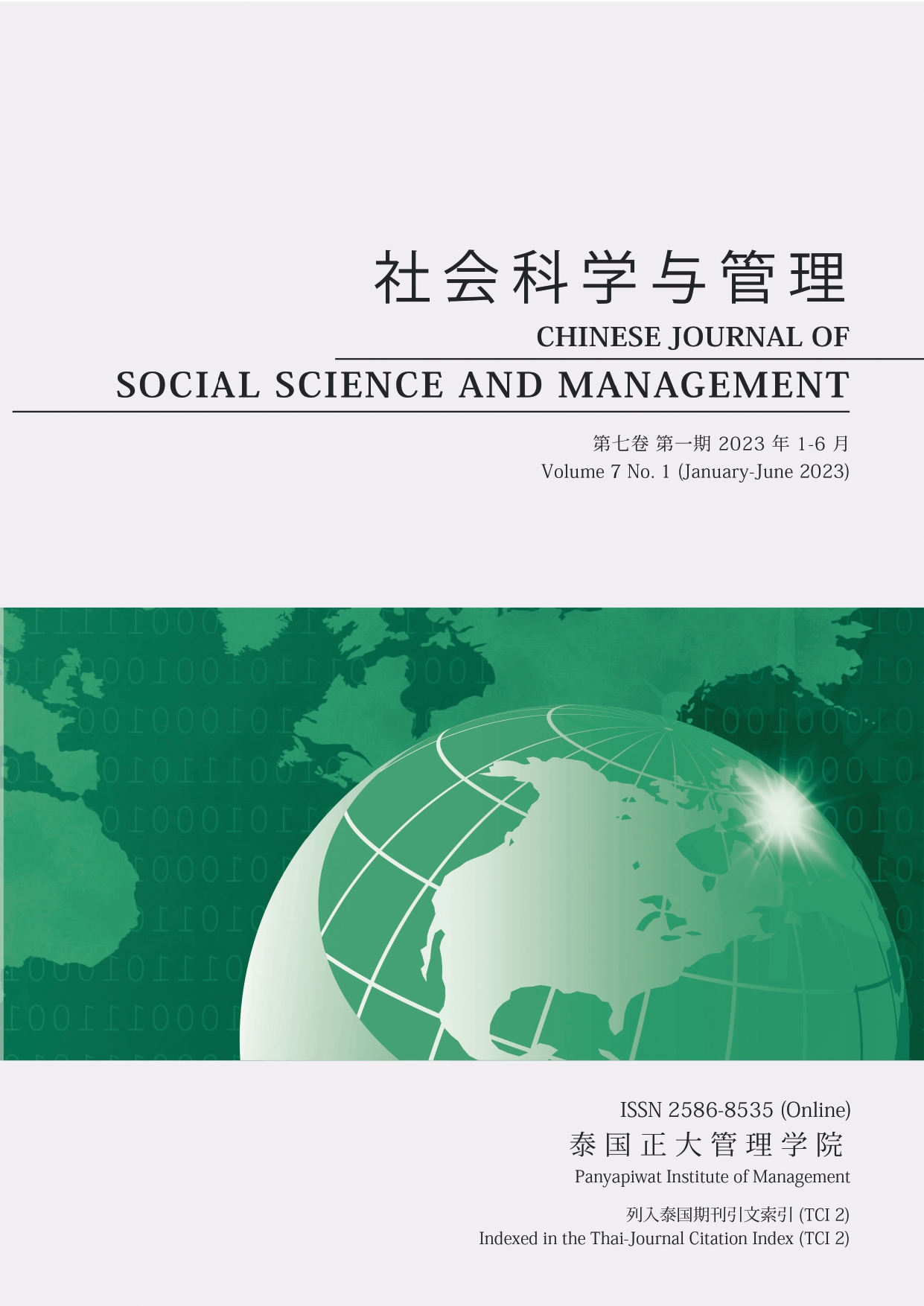THE ANALYSIS OF CHINA UNIQUE SMALL TOWN POLICY FROM THE PERSPECTIVE OF ECOLINGUISTICS
Main Article Content
Abstract
China’s government has attempted to take a unique path compared to other countries all over the world in the domains of urbanization and rural development. Unique Towns is one of the important institutional forms of entrepreneurship of this type. Unique Towns is a term initially put forward by a Chinese institutional entrepreneur in the document Notice on Developing Unique Towns, which was jointly issued by Ministry of Housing and Urban-Rural Development of the People’s Republic of China, China National Development and Reform Commission and China Ministry of Finance (2016), in a plan to build approximately 1,000 unique towns in China. According to the Chinese government’s documents, Unique Town is a new concept that is completely different from the traditional idea of a town as an administrative unit, which is also not an industrial park but rather an innovation and entrepreneurship platform in the sense that it can integrate industrial production, residents’ daily life, and ecological space as three elements in a harmonious way. This article revealed the gap between the logic preset by the Chinese government and the logic received through public cognition by deploying Ecolinguistics discourse analytical methods of Salience and Erasure, etc. under the basis of examining the promotional corpus of the frst batch 127 China Unique Towns publishing by China Science and Technology Development Center with AntConc 3.2.0 as an auxiliary tool. In public social discourse represented by the promotion materials of the 127 Unique Towns, there is a keynote narration of tourism, which establishes a tourism-oriented story structure in the public’s mind. There is an obvious institutional logic shift from community logic to market logic in the process of Unique Town’s institutional entrepreneurship in China, which might be one of the important reasons for the failure of institutional entrepreneurship. According to the related theories in Ecolinguistics, language influences how we think about the world, and how we think influences how we act. Narrative economics believes that a wide range of discourses in the public language system can influence public ideas, and the spread of popular stories that could change through time can affect economic outcomes. This article aimed to illustrate how discourse influences human behavior through analyses of a range of texts regarding China’s Unique Town. The goal of the analysis was to reveal the underlying stories people live by in the process of China Unique Town’s institutional entrepreneurship. This study suggests that changing the narrative modes of the public discourse system to construct more reasonable speech frame models could improve the effect of institutional entrepreneurship of China’s Unique Towns at the top level.
Article Details

This work is licensed under a Creative Commons Attribution-NonCommercial-NoDerivatives 4.0 International License.
Chinese Journal of Social Science and Management Editorial Division
The Office of Research and Development, Panyapiwat Institute of Management
85/1 Moo 2, Chaengwattana Rd., Bang Talat, Pakkred, Nonthaburi 11120, Thailand
Tel. 02 855 01048 E-mail: cjssm@pim.ac.th
References
China National Development and Reform Commission, & China Ministry of Finance. (2016). Guiding opinions on accelerating the construction of beautiful unique towns (city). https://www.ndrc.gov.cn/xxgk/zcfb/tz/201610/t20161031_963257.html?code=&state=123 [in Chinese]
China National Development and Reform Commission. (2017). Several suggestions on regulating the promotion of the construction of unique cities and towns. https://www.ndrc.gov.cn/xwdt/ztzl/xxczhjs/ghzc/202112/t20211209_1307311.html?code=&state=123 [in Chinese]
China National Development and Reform Commission. (2018). Notice on establishing a mechanism for high-quality development of unique cities and towns. http://www.gov.cn/zhengce/zhengceku/2018-12/31/content_5435071.htm [in Chinese]
China National Development and Reform Commission. (2020). Suggestions on promoting the standardized and healthy development of unique towns. http://www.gov.cn/zhengce/content/2020-09/25/content_5547095.htm [in Chinese]
China National Knowledge Infrastructure. (2022a). Number of publications in time sequence based on content retrieval of “unique towns”. https://kns.cnki.net/kns8/defaultresult/index [in Chinese]
China National Knowledge Infrastructure. (2022b). Research of academic disciplines based on content retrieval of “unique towns”. https://kns.cnki.net/kns8/defaultresult/index [in Chinese]
China National Knowledge Infrastructure. (2022c). Themes analysis based on content retrieval of “unique towns”. https://kns.cnki.net/kns8/defaultresult/index [in Chinese]
China’s State Council. (2014). National new urbanization plan (2014-2020). http://www.gov.cn/gongbao/content/2014/content_2644805.htm [in Chinese]
Dunn, M.B., & Jones, C. (2010). Institutional logics and institutional pluralism: The contestation of care and science logics in medical education. Administrative Science Quarterly, 55(3), 114-149.
Fillmore, C. J., & Petruck, M. R. L. (2003). FrameNet glossary. International Journal of Lexicography, 3(16), 359-361.
Lakoff, G., & Johnsen, M. (2003). Metaphors we live by. The University of Chicago Press.
Liu, H. T. (2018). Advances in quantitative linguistics. Zhejiang University Press. [in Chinese]
Ministry of Housing and Urban-Rural Development of the People’s Republic of China. (2016). Notice on the unique towns recommended of 2016. https://www.mohurd.gov.cn/gongkai/fdzdgknr/tzgg/201608/20160803_228412.html [in Chinese]
Ministry of Housing and Urban-Rural Development of the People’s Republic of China, China National Development and Reform Commission, & China Ministry of Finance. (2016). Notice on developing unique towns. https://www.mohurd.gov.cn/gongkai/fdzdgknr/tzgg/201607/20160720_228237.html
[in Chinese]
Science and Technology Development Center of China Unique Towns. (2017). List of promotion of China unique towns. http://tsxiaozhen.com/html/beijing/ [in Chinese]
Shiller, R. J. (2019). Narrative economics: How stories go viral & drive major economic events. Princeton University Press.
Stibbe, A. (2015). Ecolinguistics: Language, ecology and the stories we live by. Foreign Language Teaching and Research Press.
Thornton, P. H., & Ocasio, W. (1999). Institutional logics and the historical contingency of power in organizations: Executive succession in the higher education publishing industry. American Journal of Sociology, 105(3), 801-844.
Thornton, P. H., & Ocasio, W. C. (2008). Institutional logics. Sage Publications.
Thornton, P. H., Ocasio, W. C., & Lounsbury, M. (2012). The institutional logics perspective: A new approach to culture, structure, and process. Oxford University Press.
Whorf, K. E. (2011). Language, thought and reality. Martino Fine Books.
Zeng, G. J., Chen, X., & Yu, G. X. (2019). Annual research report on unique towns in China 2019. China Social Sciences Academic Press. [in Chinese]


